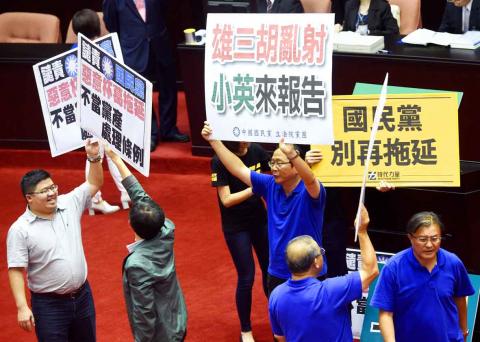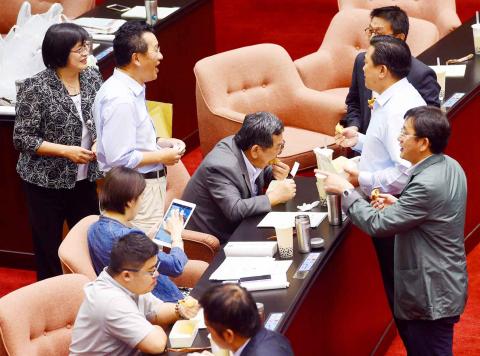The Chinese Nationalist Party (KMT) caucus yesterday obstructed scheduled legislative proceedings to pass a bill on ill-gotten party assets by calling for votes on each first-reading bill on the floor agenda, of which there were more than 200.
The Democratic Progressive Party (DPP) caucus and the New Power Party (NPP) proposed to extend the meeting until midnight.
The legislative floor meeting commenced later than usual yesterday morning, as the DPP caucus had a prolonged caucus meeting, after which DPP caucus whip Ker Chien-ming (柯建銘) said the caucus planned to achieve two things — the passage of the bill on ill-gotten party assets and the announcement of a joint statement concerning the South China Sea ruling.

Photo: Lo Pei-der, Taipei Times
The latter was achieved, while the former had not been dealt with as of press time last night.
Soon after the general assembly meeting started, the KMT caucus demanded a roll call vote as the method of voting in yesterday’s meeting, which DPP lawmakers and Legislative Speaker Su Jia-chyuan (蘇嘉全) said would have to be decided by a vote.
DPP Legislator Wu Ping-jui (吳秉叡) shouted in the chamber: “The voting system we have now is already a name-registering vote. I see no reason why the KMT caucus has to raise the need to change it, other than to try to hamper legislative proceedings and protect their party assets.”

Photo: Lo Pei-der, Taipei Times
The voting system in the general assembly chamber consists of two electronic boards at the front of the chamber that display the names of lawmakers and flashes green, red or yellow for “yea,” “nay” and abstain respectively.
NPP Executive Chairman Huang Kuo-chang (黃國昌) also criticized the KMT caucus, saying its measures were “ridiculous” and calling on the party to “stop throwing a fit and step back from the brink.”
KMT lawmakers, all clad in blue in a show of solidarity, from that point on called for a roll call vote, a vote and a revote for each first-reading bill that was to be referred to committees for review by dissenting against which committees the proposals were to be referred to.

Photo: Lo Pei-der, Taipei Times
There were a total of 276 cases to be referred to committees on the floor agenda yesterday.
In the morning, only six of the 276 were processed. Under typical legislative procedures, the second and third readings of bills on the discussion agenda would be dealt with only after all the committee-referral cases were done.
In the front of the chamber, the KMT lawmakers held up placards and chanted slogans demanding that President Tsai Ing-wen (蔡英文) report to the Legislative Yuan on the recent accidental launch of a missile and a ruling on the South China Sea by an international court.
One placard asked if Tsai was a US lackey, while another read: “An inch of [our] mountains and rivers [equals] an inch of [our] blood,” a phrase first used by the Republic of China’s armed forces during the Second Sino-Japanese War.
“Defend our sovereignty and protect our fishing rights,” was another slogan the KMT lawmakers repeated.
In the middle of voting in the evening, NPP Legislator Freddy Lim (林昶佐) discovered that newly elected KMT caucus convener Sufin Siluko (廖國棟) was pressing the voting button for former legislative speaker Wang Jin-pyng (王金平), who was absent, which was condemned.
KMT lawmakers later accused DPP lawmakers of voting for other legislators who had temporarily left their seats.
Yesterday was the last day of this year’s first legislative session.
Two extraordinary sessions later this month and next month are expected to be called, the DPP caucus said earlier this week.
The legislature was dealing with the 58th item on the agenda as of 9pm yesterday.
Additional reporting by Abraham Gerber

ACTION PLAN: Taiwan would expand procurement from the US and encourage more companies to invest in the US to deepen bilateral cooperation, Lai said The government would not impose reciprocal tariffs in retaliation against US levies, President William Lai (賴清德) said yesterday, as he announced five strategies to address the issue, including pledging to increase Taiwanese companies’ investments in the US. Lai has in the past few days met with administrative and national security officials, as well as representatives from various industries, to explore countermeasures after US President Donald Trump on Wednesday last week announced a 32 percent duty on Taiwanese imports. In a video released yesterday evening, Lai said that Taiwan would not retaliate against the US with higher tariffs and Taiwanese companies’ commitments to

Intelligence agents have recorded 510,000 instances of “controversial information” being spread online by the Chinese Communist Party (CCP) so far this year, the National Security Bureau (NSB) said in a report yesterday, as it warned of artificial intelligence (AI) being employed to generate destabilizing misinformation. The bureau submitted a written report to the Legislative Yuan in preparation for National Security Bureau Director-General Tsai Ming-yen’s (蔡明彥) appearance before the Foreign Affairs and National Defense Committee today. The CCP has been using cognitive warfare to divide Taiwanese society by commenting on controversial issues such as Taiwan Semiconductor Manufacturing Co’s (TSMC, 台積電) investments in the

HELPING HAND: The steering committee of the National Stabilization Fund is expected to hold a meeting to discuss how and when to utilize the fund to help buffer the sell-off The TAIEX plunged 2,065.87 points, or 9.7 percent, to close at 19,232.35 yesterday, the highest single-day percentage loss on record, as investors braced for US President Donald Trump’s tariffs after an extended holiday weekend. Amid the pessimistic atmosphere, 945 listed companies led by large-cap stocks — including Taiwan Semiconductor Manufacturing Co (TSMC, 台積電), Hon Hai Precision Industry Co (鴻海精密) and Largan Precision Co (大立光) — fell by the daily maximum of 10 percent at the close, Taiwan Stock Exchange data showed. The number of listed companies ending limit-down set a new record, the exchange said. The TAIEX plunged by daily maxiumu in just

‘COMPREHENSIVE PLAN’: Lin Chia-lung said that the government was ready to talk about a variety of issues, including investment in and purchases from the US The National Stabilization Fund (NSF) yesterday announced that it would step in to staunch stock market losses for the ninth time in the nation’s history. An NSF board meeting, originally scheduled for Monday next week, was moved to yesterday after stocks plummeted in the wake of US President Donald Trump’s announcement of 32 percent tariffs on Taiwan on Wednesday last week. Board members voted to support the stock market with the NT$500 billion (US$15.15 billion) fund, with injections of funds to begin as soon as today. The NSF in 2000 injected NT$120 billion to stabilize stocks, the most ever. The lowest amount it